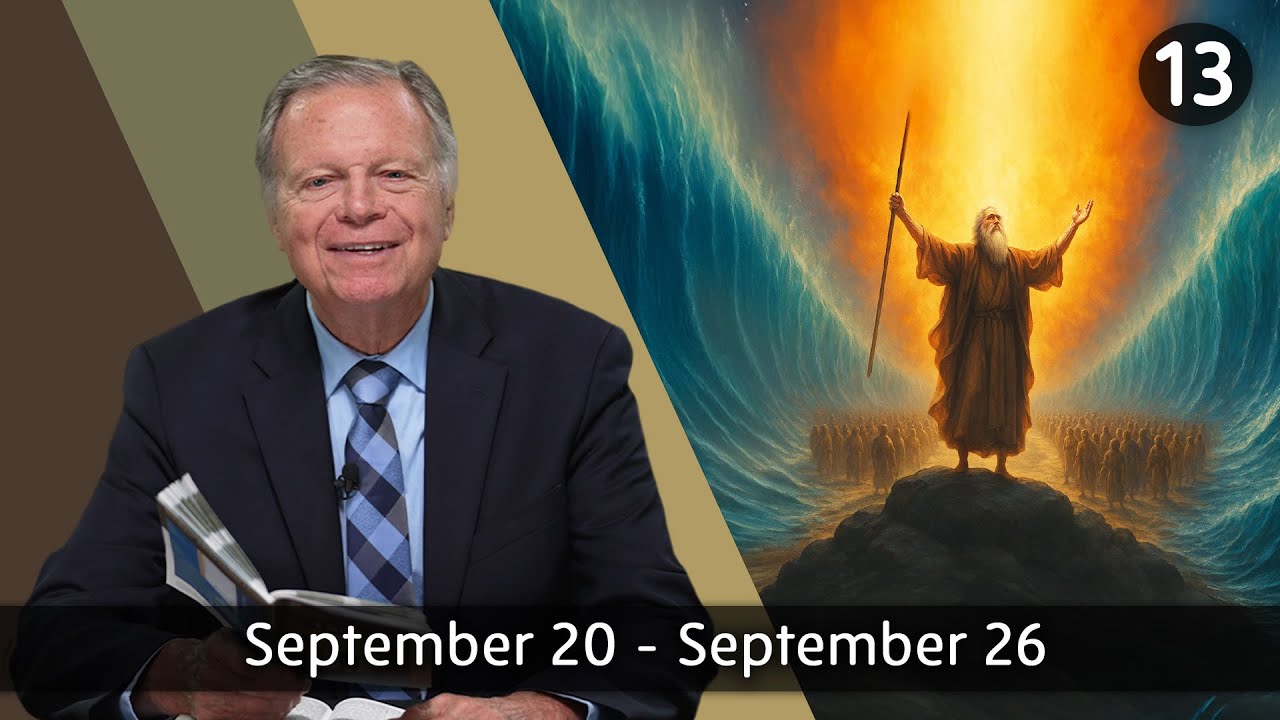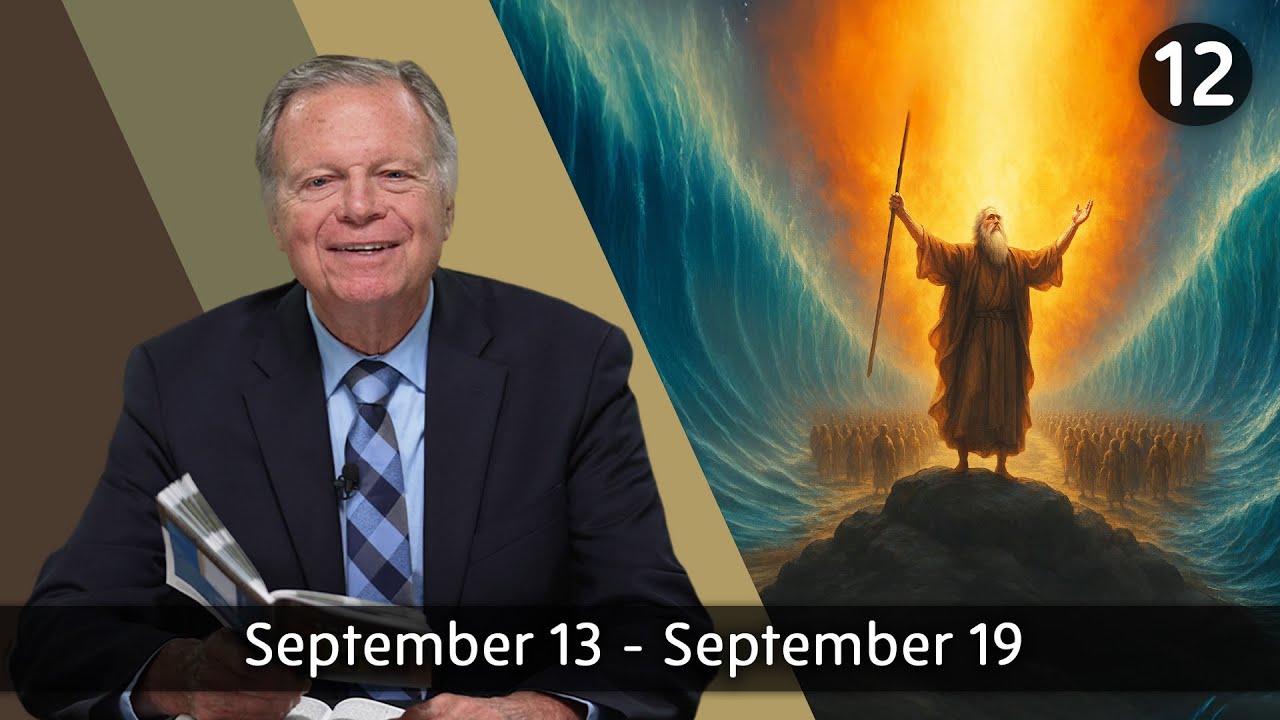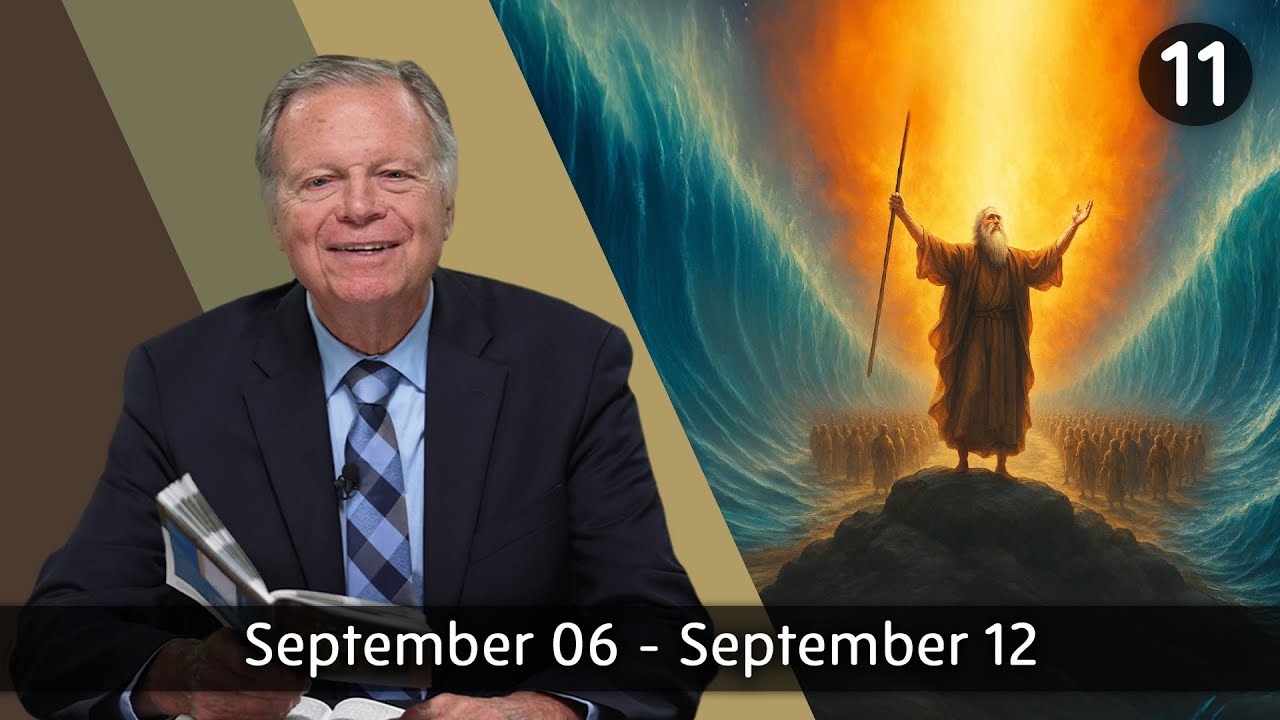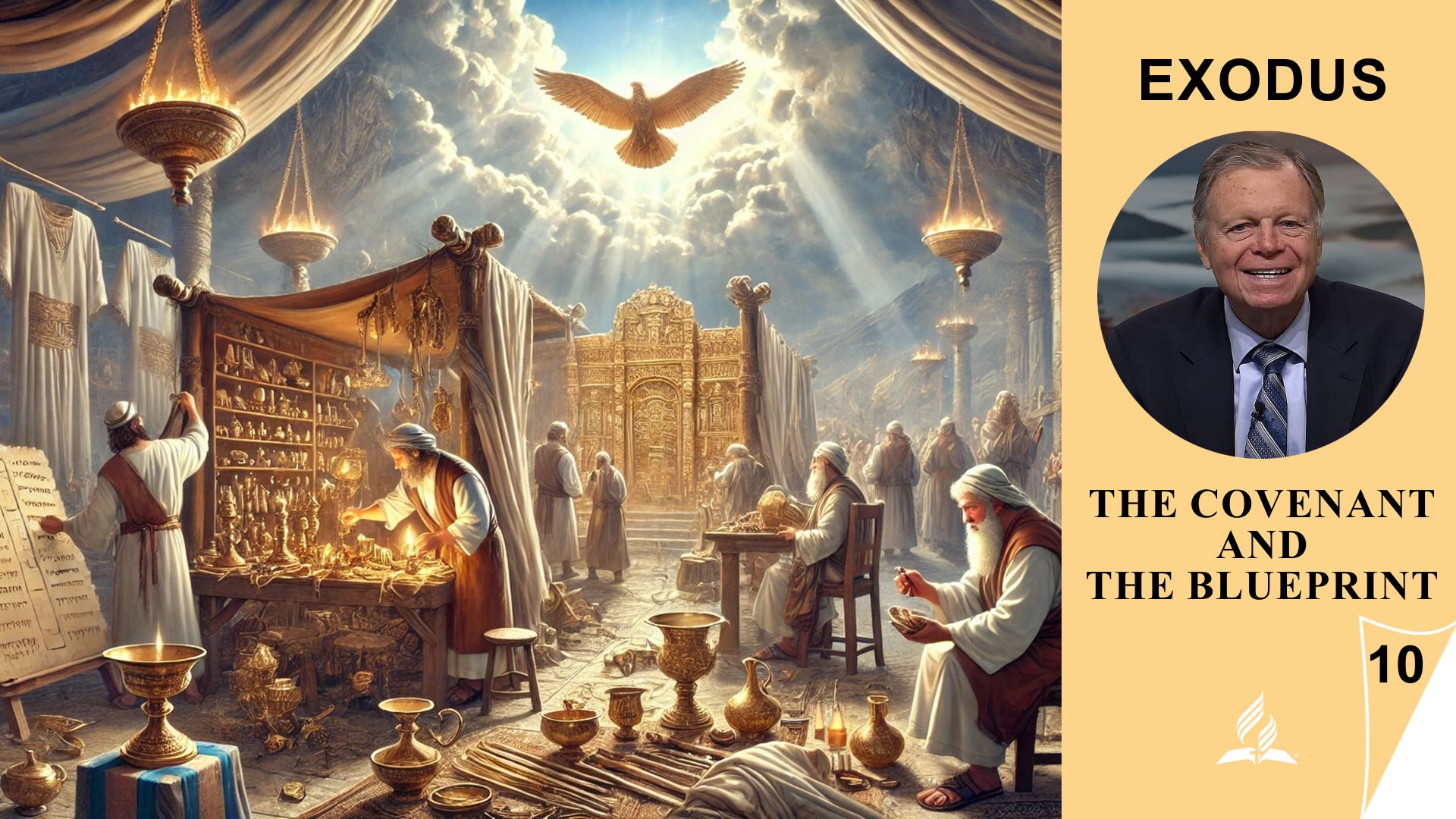
Exodus – Lesson 12. “Please, Show Me Your Glory” | 📘 Sabbath School with Pastor Mark Finley

Series EXODUS with Pastor Mark Finley
Lesson 12. “Please, Show Me Your Glory”
The Longing for God’s Presence
Moses had already experienced many extraordinary encounters with God — yet his heart longed for more. He did not only want to serve God, but to truly know Him, to understand His nature, and to live in close fellowship with Him.
In the midst of disappointment and spiritual struggle, Moses asked for the highest thing imaginable: “Let me see Your glory!”
This request reveals a deep longing for God’s presence and shows that true spiritual maturity always goes hand in hand with an ever-growing desire for God.
In this lesson, we discover how God reveals Himself — not through spectacular signs, but through the beauty of His character.
Those who perceive the glory of God are themselves transformed and begin to reflect it in their own lives.
Contents:
12.1 The Tent of Meeting
A Place of Nearness – Where God Speaks with Man
The Tent of Meeting was a visible expression that God, despite the people’s apostasy, still desired closeness with them.
It stood outside the camp — a place of separation, yet also of deep fellowship.
There, Moses met with God as a friend speaks with a friend — an astonishing statement of trust and intimacy.
This relationship was not one-sided: Moses actively sought God’s presence, and God responded.
His time with God in the tent transformed him — outwardly and inwardly.
Likewise for us, spiritual growth becomes possible when we deliberately and regularly seek God’s presence.
12.2 That I May Know You
To Know God – Not Just to Know About Him
Moses had already witnessed great miracles and spent much time with God, yet he realized that his understanding of Him was still incomplete.
In deep humility he prayed, “Let me know Your ways, that I may know You.”
This desire was not driven by intellectual curiosity but by a passionate longing for genuine relationship.
Moses understood: only if God’s presence led him could he fulfill his calling.
God responded with grace and a promise to remain with him.
This scene teaches us that spiritual maturity does not mean knowing everything, but continually seeking to know God more deeply.
12.3 “Please, Show Me Your Glory”
Understanding God’s Nature – His Goodness Is His Glory
Moses’ request to see God’s glory came from a deep yearning not just to serve God but to truly know Him.
God granted this request not through a display of overwhelming power, but by revealing His goodness — for that is His true essence.
In doing so, God showed that His glory is found in His patience, grace, and love toward imperfect people.
This divine goodness transforms hearts and leads to repentance.
When we recognize God’s character — most clearly revealed at the cross of Christ — we ourselves are changed.
We too become mirrors of His glory — in our daily life, in our character, and in our relationships with others.
12.4 The Self-Revelation of God
The Name of the LORD – Who God Truly Is
In Exodus 34, God revealed to Moses His true nature — not in the form of an image, but through words describing His identity.
He calls Himself merciful, gracious, patient, abounding in steadfast love and faithfulness — a self-description that becomes the core of the biblical message.
This scene is the “John 3:16” of the Old Testament because it shows that God’s glory lies in His character, not merely in His power.
Moses responds with worship, for true knowledge of God always leads to adoration.
In this moment, God also renews His covenant with the people and promises to perform wonders among them — if they remain faithful to Him.
This revelation calls us to know God’s character more deeply and to respond with love and obedience.
12.5 The Shining Face of Moses
Transformed by God’s Presence
The shining of Moses’ face was a visible sign of the inner transformation produced by his deep encounter with God’s goodness and nature.
It was not merely proximity to God, but the conscious recognition and acceptance of His character that brought about this change.
Moses himself was unaware of his radiance — true spiritual maturity often shows itself in humility and unconscious grace.
His glowing face became a mirror of God’s glory and a testimony to the people.
We too can be transformed when we open our hearts and fix our eyes on Christ, as Paul writes in 2 Corinthians 3:18.
The glory that changes us begins with the recognition of God’s love — and leads to a life that reflects Him.
12.6 Summary
To Know God – and Be Transformed
Lesson 12 reveals Moses’ deep spiritual journey — though he had already experienced much with God, he longed for an even closer relationship with Him.
His plea to see God’s glory sprang from a desire to understand God’s nature more fully.
God responded by revealing not only His power but above all His goodness, grace, and faithfulness — the true core of His glory.
This encounter transformed Moses so profoundly that his face began to shine — a visible sign of inner transformation through God’s presence.
We too are transformed when we seek God not only with our minds but with our hearts.
This lesson invites us to seek God’s nearness, to contemplate His character, and to let Him shape our lives.
Exodus – Lesson 11.Apostasy and Intercession | 📘 Sabbath School with Pastor Mark Finley

Series EXODUS with Pastor Mark Finley
Lesson 11.Apostasy and Intercession
When Faith Falters – and Grace Appears
Lesson 11 leads us into one of the darkest yet most instructive episodes of Israel’s wilderness journey. While Moses was on Mount Sinai receiving God’s law, the people below lost their faith and turned to false gods. This dramatic fall shows how quickly humanity can slip into unbelief and sin without steadfast faith. Yet amid judgment shines a radiant example of divine grace: Moses’ intercession for an unfaithful people. His love, patience, and willingness to sacrifice reflect God’s heart, who does not desire the death of the sinner but his repentance. This lesson calls us to remain faithful to God and to stand for one another in prayer.
Content:
11.1 Failed Leadership
Weak Leadership in Times of Trial
Aaron’s failure shows the danger when spiritual leaders yield to the pressure of the majority instead of trusting God. In a moment of fear and uncertainty, Aaron lost spiritual clarity and was carried away by the people’s emotions. Instead of admonishing them and reminding them of God’s commands, he sought peace at the cost of truth. This example reminds us that true leadership requires courage, especially when obedience to God is unpopular. Aaron’s compromise led the people into sin, while genuine faith demands steadfastness, especially in times of crisis.
11.2 Idolatry and Evil
From Apostasy to Moral Decline
Israel’s idolatry quickly led them into moral and spiritual corruption. Once they turned from God, their worship lost all holiness and became a feast of self-glorification. By worshiping an image of an animal, they degraded not only God but also themselves. Idolatry distorts the understanding of creation and Creator—humans exalt their own works and replace the living God. This story shows that every false “god”—whether of gold, power, pleasure, or selfishness—ultimately separates us from God. This pattern repeats today whenever people value created things above the Creator Himself.
11.3 Corrupting Themselves
When the Heart Turns from the Creator
Israel’s “shameful acts” were not merely disobedience but a conscious betrayal of God’s love and guidance. By attributing their deliverance to a lifeless image, they denied the living God who had redeemed them with power. This distortion of truth led to spiritual blindness and moral decay. Idolatry often begins subtly—with things that may not be bad in themselves but take God’s place in our hearts. When God is not at the center, something else inevitably takes that place. Thus this story calls us to examine our hearts and keep our living relationship with God above all else.
11.4 God’s Righteous Wrath
God’s Wrath and Moses’ Intercession
God’s righteous anger against Israel’s idolatry shows that sin has serious consequences and cannot be trivialized. Yet this event also reveals the depth of God’s grace, for Moses bravely stood as intercessor for the people. Instead of seeking his own gain, Moses reminded God of His promises and pleaded for mercy—a moving example of selfless prayer. His actions show that true faith expresses itself in compassion, even for the misguided. God’s wrath is never arbitrary but an expression of His holiness and His desire to destroy evil, not humanity. This story reminds us how powerful prayer can be when it flows from love and trust in God’s character.
11.5 Intercession
Love That Gives Itself
Moses’ intercession reveals one of the deepest expressions of selfless love in Scripture. He was willing to give up his own life if God would forgive His people—a foreshadowing of Christ’s sacrificial love. His prayer shows that true intercession is more than words; it is bearing the burdens of others in one’s heart. Moses understood that only God Himself could bear the guilt of the people—a thought fulfilled in Jesus’ sacrifice on the cross. This scene shows that forgiveness always has a cost, one that God Himself was willing to pay. It calls us to live compassion, sacrifice, and prayer for others as the true expression of discipleship.
11.6 Summary
From Apostasy to Intercession: Lessons from the Golden Calf
Lesson 11 reveals Israel’s tragic apostasy when, during Moses’ absence, they worshiped the golden calf. Their impatience and distrust of God quickly led to idolatry, moral decay, and open rebellion. Aaron failed as a leader by yielding to the people’s pressure instead of standing firm for God’s honor. Yet in the midst of this chaos, Moses stood as a faithful intercessor, praying for the sinful people and even willing to sacrifice his life for them. This story reveals both the gravity of sin and the greatness of divine mercy. It reminds us that true spiritual leadership requires humility, courage, and selfless love—qualities that find their perfect image in Christ.
Exodus – Lesson 10.The Covenant and the Blueprint | Sabbath School with Pastor Mark Finley

Series EXODUS with Pastor Mark Finley
Lesson 10.The Covenant and the Blueprint
A God Who Connects, Dwells, and Transforms
God never makes a covenant without purpose – His desire has always been to dwell among His people and draw them into fellowship with Himself. In Lesson 10, we discover how the covenant at Sinai was confirmed not only through words and blood, but through a living relationship. The sanctuary that God commanded was to be a visible sign of His nearness – a place where His holiness, grace, and redemption could be experienced. Yet this blueprint was more than symbolic: it pointed to Christ – the true sacrifice and the source of true communion. Even today, God equips people with His Spirit to serve Him – in obedience, beauty, and love. The covenant remains an invitation to a genuine, deep relationship with a holy and gracious God.
Content:
10.1 The Book and the Blood
Covenant of Grace – Relationship, Not Just Obedience
The covenant at Sinai was not a mere legal contract but the expression of a profound relationship between God and His people. The reading of the law reminded Israel of God’s will, while the blood symbolized the grace that made obedience possible. Israel sincerely promised to obey, yet without fully understanding its own weakness. Only through Jesus’ sacrifice – foreshadowed by that blood – can true obedience grow from grace. The covenant shows that God seeks not perfection, but relationship. Even today, we depend on that same grace to live what our lips confess.
10.2 Seeing God
Encountering God – and Yet Falling?
The elders of Israel experienced something astonishing: they saw God and ate in His presence – a symbol of intimate fellowship. Yet, even such closeness did not protect them from later failure. This reveals that sacred experiences or spiritual privileges cannot replace genuine heart transformation. God invites us into relationship, not merely awe. Those who commune with Him are also called to repentance and faithfulness. For believers today, this stands as a warning: light without humility can lead to darkness if it does not result in change.
10.3 Power to Obey
Obedience – God’s Work Within Us
True obedience does not arise from human effort but from God’s work within. Ezekiel describes how God removes the heart of stone and gives a living heart – able to hear, love, and obey. Our role is to surrender daily and accept His leading. Obedience is therefore not a human achievement but a gift of grace made effective by the Holy Spirit. When God commands, He also empowers. The greatest challenge remains: to die to self so that Christ may live and act within us.
10.4 In the Midst of His People
A God Who Dwells – Not Just Reigns
God desired more than obedience – He wanted to dwell among His people. The sanctuary was the expression of that nearness: a place where His presence could be seen and felt. Every aspect of the sanctuary pointed to Jesus and the plan of salvation to come. Though He fills heaven, God humbles Himself to be present with us – a profound act of grace. The sanctuary’s construction from freewill offerings showed that God’s nearness depends on relationship and dedication. Today, He desires to dwell not in buildings but in hearts that make room for Him.
10.5 Filled With the Spirit of God
The Holy Spirit – Power for Service, Beauty, and Holiness
For the construction of the sanctuary, God not only empowered Moses but filled Bezalel, Oholiab, and others with His Spirit – giving them wisdom, artistry, and understanding. This shows that the Spirit works not only in preaching but also in creative, practical service for God. At the same time, the Sabbath remained a central sign of sanctification – not as human effort, but as a testimony of divine transformation. The highest expression of God’s gift was the law, written on stone by His own hand and placed beneath the mercy seat. This arrangement reveals a profound truth: God’s grace stands above His law – not in opposition, but as hope for all who struggle with weakness. The Spirit works in us so that we may honor God in all things – with heart, hands, and life.
10.6 Summary
God’s Nearness – Grace, Law, and Presence
Lesson 10 shows that God’s covenant is not just about words but about relationship, nearness, and transformation. Through the shed blood and the written word, the covenant with Israel was confirmed – yet its true power lies in God’s grace. The tabernacle was a sign that God longed to dwell among His people. He even filled craftsmen with His Spirit so His presence could be made visible and tangible. Obedience, sanctification, and creativity are not human works but expressions of divine activity within us. Above all stands His law – protected beneath the mercy seat – showing that God’s justice is always upheld by His mercy.
Exodus – Lesson 7.The Bread and Water of Life | Sabbath School with Pastor Mark Finley

Series EXODUS with Pastor Mark Finley
Lesson 7.The Bread and Water of Life
God’s Provision in the Wilderness
Lesson 7 takes us into the heart of Israel’s wilderness journey, where God faithfully provided for His people despite their weaknesses and unbelief. Water, bread, and even meat became signs of His power and love. Each event—from the bitter waters at Marah, to the manna, to the water from the rock—contains spiritual lessons for us today. God wanted Israel to learn that true life depends not only on material provision, but on connection with Him. Even through rebukes and tests, He was preparing them for trust, obedience, and gratitude. These experiences are prophetic pointers to Jesus Christ, our true “Bread of Life” and “Living Water.”
Content:
7.1 Bitter Waters
From Bitter Waters to Sweet Trust
The experience at the bitter waters of Marah was Israel’s first major test of faith after crossing the Red Sea. Instead of remembering God’s recent miracles, they allowed doubt and murmuring when the water was undrinkable. Yet God responded not with punishment but with a miracle, showing that He can make even the bitterest circumstances sweet. The piece of wood used was only a sign—the power came from Him alone. This event teaches us to wait patiently for God’s timing and trust that He works in cooperation with us. Even when our troubles are self-inflicted, God is still willing to help if we turn to Him in faith.
7.2 Quail and Manna
Bread from Heaven – Learning Daily Trust
The gift of quail and manna was God’s answer to Israel’s murmuring in the wilderness. Instead of trusting, they longed for what they had lost and overlooked what God was providing each day. Through manna, God taught them dependence on Him—not by storing up, but by receiving daily. The weekly double portion on Friday and the absence of manna on the Sabbath reminded them of His care and the holiness of the day of rest. This miracle bread was not only physical nourishment but also a lesson in obedience and faith. Even today, God calls us to trust Him daily rather than give in to worry or impatience.
7.3 Water From the Rock
The Rock from Which Life Flows
The story of water from the rock shows God’s patience and care even when His people were full of doubt. Despite their grumbling and testing, God proved He could meet their most urgent needs. The water was more than physical provision—it was a picture of Christ, the source of eternal life. Paul later reminded believers that this rock was Christ Himself, who faithfully leads and provides. This event teaches us to rely on God’s provision even in desert seasons. Those who trust Him will find His promises hold true, even when everything around seems dry.
7.4 Jethro
Wisdom That Brings Relief
Jethro’s visit was more than a family reunion—it marked a turning point in Israel’s organization. After hearing of God’s mighty deliverance, Jethro praised the Lord and acknowledged Him as the true God. He also brought Moses practical, God-given advice: to share responsibility and appoint capable, God-fearing men as judges. This system lightened Moses’ load and created a fairer, more efficient process for the people. The story shows that God’s wisdom can come through people outside our own circle. True humility accepts counsel as a gift—no matter who it comes from.
7.5 The Bread and Water of Life
Christ – The True Source
Paul reminds us that Israel’s wilderness experiences were recorded as warnings and examples for us. Both the manna and the water from the rock prophetically point to Christ, who alone satisfies our spiritual hunger and thirst. In His conversation with the Samaritan woman, Jesus revealed that He gives “living water”—a source that never runs dry. Likewise, He declared Himself to be “the Bread of Life,” offering eternal satisfaction. These images show that only in Christ do we find true life, lasting peace, and deep fulfillment. Those who come to Him daily receive strength, joy, and spiritual nourishment for the journey.
7.6 Summary
God’s Provision – Lessons from the Wilderness
Lesson 7 shows how God provided bread, water, and divine guidance for His people in the wilderness. Despite repeated murmuring and unbelief, He acted with patience, teaching them trust, obedience, and gratitude. The bitter waters at Marah, manna from heaven, and water from the rock were not only physical provisions but also spiritual lessons. God wanted to show them that true life comes from His hand alone. Through Jethro’s wise counsel, they also learned the value of good leadership and order. These experiences point prophetically to Christ, the “Bread of Life” and the “Living Water,” who alone can satisfy our deepest hunger and thirst.
- « Previous Page
- 1
- 2
- 3
- 4
- 5
- …
- 385
- Next Page »
